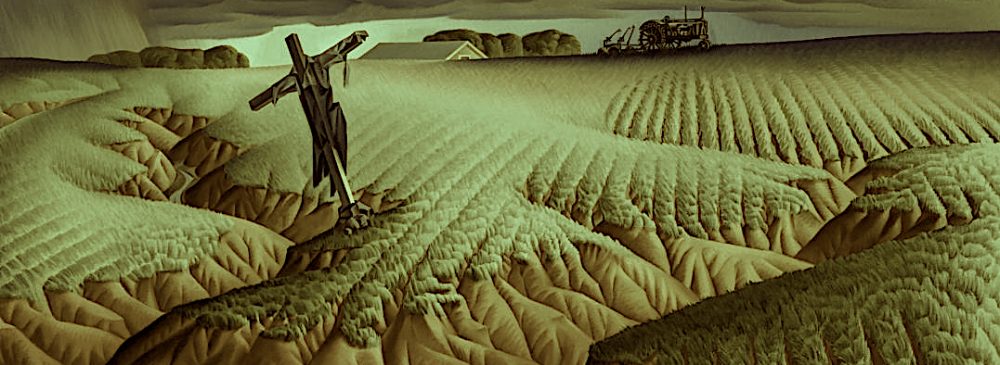introductions
Thursday8/17
| Introduction to the course |
Week 1: what is environmental history and how do i use it?
Tuesday8/22 |
in classPresentation and Discussion – Irrational Landscape: The Great Plains and its towns. before class
|
Thursday8/24 | IN classWorkshop – Reading Wooster and Wayne County before classWalk south down Beall Avenue to Liberty Street downtown, turn west on Liberty and walk to Market Street, turn north, walk to University Street and turn east back to campus. (The whole distance is about two miles and will take about an hour. Wear comfortable shoes.) Consider the the layout of this rectangle with the College at the north and downtown to the south. How is the space arranged? Pay attention to the types of built spaces and where they are in relation to other built spaces. |
Week 2: wilderness and the american mind
Tuesday8/29 | in classPresentation/Discussion – American Wilderness and Sublime Landscapes Before ClassThomas Moran, The Grand Canyon of the Colorado Research and take a one-paragraph note on the meaning and significance of “sublime landscape” paintings |
Thursday8/31 | in classWorkshop – Wilderness as an Academic Enterprise Before ClassRead and Take Notes on the following articles from the first ever issue of Environmental History Cronon, “The Trouble with Wilderness” Hays, “The Trouble with Bill Cronon’s Wilderness” Cohen, “Resistance to Wilderness” Dunlap, “But What Did You Go Out into the Wilderness to See?” |
Week 3: Understanding environmental history part one
Tuesday9/5 | in classPresentation/Discussion: Understanding Environmental History – A Midterm Study Session Before ClassRead: Fiege, The Republic of Nature, pages ix-99 Read: Jacobs, “The Great Bophuthatswana Donkey Massacre” (You will be asked to write your essay on one aspect of this article.) |
Thursday9/7 | in classMidterm One. Before ClassReview Lecture/Discussion/Presentation Notes. Review notes from workshops. Read and review the articles and chapters assigned so far. |
Week 4: Case Study – the great plains: 1541-1931
Tuesday9/12 | in classPresentation/Discussion: Settler Colonialism: Race, Space, and Nature on the Great Plains 1541-1876 Before ClassResearch and write two-paragraph description of settler colonialism. One paragraph on what it means and a second on how it helps us understand the past. Read: Fiege, The Republic of Nature, 100-228 |
Thursday9/14 | in classPresentation/Discussion: The Agricultural Wonderland |
Week 5: Case study – Ruin: The Great plains 1931-1941
Tuesday9/19 | in classPresentation: The Dust Bowl Before Class |
Thursday9/21 | in classPresentation/Workshop: The Art of the Dust Bowl: Film, Photography, Painting, and Music Alexandre Hogue’s “Drouth Survivors”: The Ten-Minute Research Paper Before ClassCheck out the paintings of Alexandre Houge, the Dust Bowl Ballads of Woody Guthrie, and the photographs of Dorothea Lange and Arthur Rothstein. Write one-paragraph notes on each of these subjects. |
|
|
Week 6: case study: understanding the dust bowl
Tuesday9/26 | in classPresentation/Discussion: Dueling Narratives, Opposing Logics: New Dealers and Boosters and the Ropesville Project. Before Class |
Thursday9/28 | in classWorkshop: Building the Five-Paragraph Research Paper Before ClassReview all your notes on New Deal Art. |
| Sunday10/1 | Research Paper Due: 5:00 p.m.Send a pdf of your paper directly to my email. NOT A LINK – but the actual attachment. title your document with your last name first and then the words dust bowl paper. Like this – bairddustbowlpaper. NOT dustbowlpaperbaird, or dustbowlpaper or historypaper. |
Week 7: Conservation and PReservation and knowledge
Tuesday10/10 | in classPresentation/Discussion: National Parks, National Forests, and the Rise of Industrial Capitalism Before Class |
Thursday10/12 | in classDiscussion: Kimmerer, Braiding Sweetgrass Part One Before ClassRead: Kimmerer, Braiding Shortgrass ix-117 |
Week 8: The birth of the Environmental Movement
Tuesday10/17 | in classPresentation: The Birth of the Environmental Movement Before Class |
Thursday10/19 | in classDiscussion: Kimmerer, Braiding Sweetgrass Part Two Before ClassRead: Kimmerer, Braiding Shortgrass 121-200 Take one-two sentence notes on what you learned in each chapter |
Week 9: Case Study: The 1964 Wilderness Protection Act
Tuesday10/24 | in classDiscussion/Workshop: What to do with the Wilderness Act? Before ClassCollect ten documents on the 1964 Wilderness Act Write one paragraph description and summary of the 1964 Wilderness Act |
Thursday10/26 | in classMidterm TwoBefore ClassReview: All readings (including the rest of Braiding Sweetgrass), media, lectures, discussion, workshops from Dust Bowl through Wilderness Act. |
Week 10: Understanding Environmental Racism
Tuesday-Thursday10/31-11/2 | in classWorkshop: Understanding Environmental Racism Before ClassRead: Ten Examples of Environmental Racism Read: Fiege, Republic of Nature, 281-402 Read: Environmental Justice in Postwar America, Part One: The Nature of Segregation Read/Watch: Examining the Effects of Environmental Inequity in Houston – Landfills Take Notes! |
|
| |
|
|
Week 11: Understanding Environmental Racism
Tuesday – Thursday11/7-11/9 | in classWorkshop: Understanding Environmental Racism Before ClassRead: Environmental Justice in Postwar America, Part Two “A More Inclusive Environmentalism Watch: Majora Carter, “Greening the Ghetto” Take Notes! |
Week 12 : Poster presentations
Tuesday-Thursday
11/14/11/16
Week 13: research
Tuesday
11/21
Week 14: research PResentations
Tuesday – Thursday
11/28-11/30
